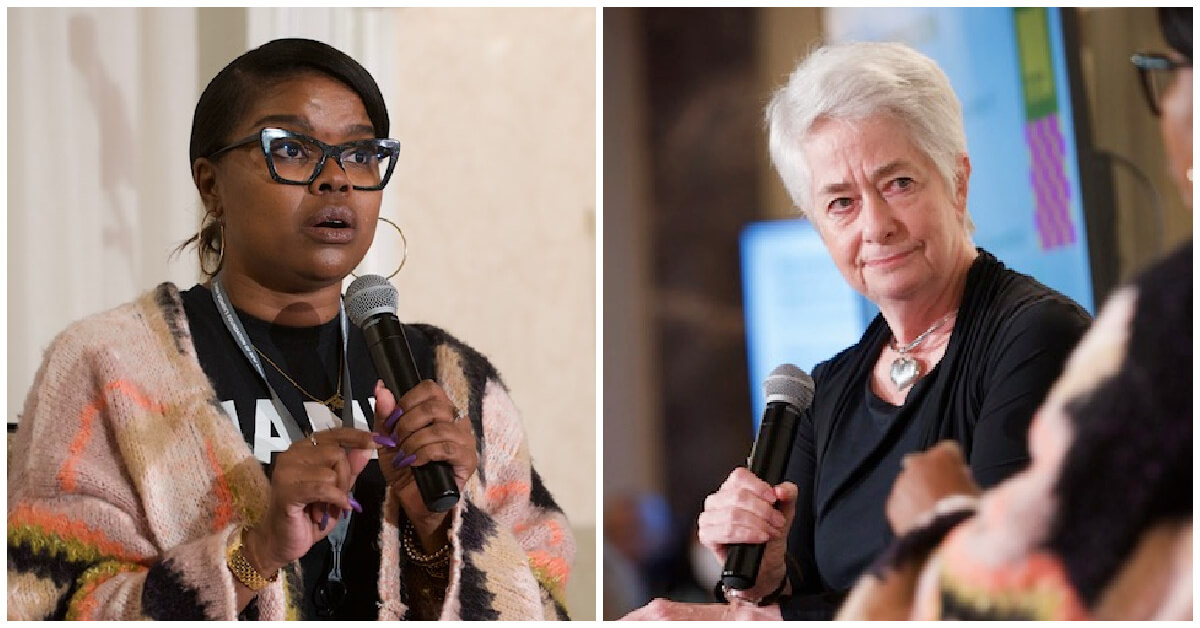With Roe’s demise, a Chicago rabbi revives a clandestine abortion network
Tamar Manasseh has revitalized the Jane Collective for a new generation

Tamar Manasseh, left, and Heather Booth are advocates for abortion rights. Photo by Leo Sorel
When the Supreme Court released its decision reversing a five-decade-old ruling legalizing abortion, Tamar Manasseh was like many Americans: sitting at home, feeling like her only recourse was, as she put it, “yelling at the TV screen.”
But Manasseh wasn’t content merely sitting on the couch. For years, she’s been a prominent activist in Chicago, having founded the anti-violence group Mothers/Men Against Senseless Killing (MASK). Her work has garnered her wide acclaim, especially after the release of the documentary “They Ain’t Ready for Me,” in which she is prominently featured. She is someone who has grown used to turning her emotions into actions.
“I can’t do aimless anger, I can’t do it,” she said. “If I’m gonna be angry, I’m gonna get active, I have to do something about it.”
Manasseh had recently watched “The Janes,” an HBO documentary on the Jane Collective, a clandestine movement formed in pre-Roe v. Wade America to help women get access to safe abortions.
The movie “set me on fire,” said Manasseh.

The Dobbs decision, which overturned Roe v. Wade, was made official on June 24. By the Fourth of July, as Manasseh drove to rural Mississippi to visit family over the holiday, she was thinking of the women in that state, where a law came into effect banning nearly all abortions just three days after the Supreme Court ruling. She thought of the pussy hats that were ubiquitous after Donald Trump was elected president, which became a symbol of allyship for women.
“If you saw a woman wearing one of those, you absolutely knew her politics,” said Manasseh. “And that’s really what we need to do with these shirts, because there’s so many girls that don’t know what to do. They don’t know where to go.”
Manasseh reached out to Heather Booth, the founder of the original Jane Collective. Booth, who at 76 is still active in progressive politics as a member of consulting group Democracy Partners, saw the Dobbs decision as undermining the will of the American people, the majority of whom support legal abortions, and an assault on the health and agency of millions of Americans.
But Booth, who is Jewish, believed it was also a violation of the separation of church and state.
“Though it may have reflected the religious beliefs of some of the justices,” she said, adding that, according to Jewish law, “if a woman’s life is endangered, an abortion is required.”
The night the decision came down, Booth had tickets to see a revival of the play “To Kill A Mockingbird.” The title refers to the sin of killing an innocent bird that harms nobody. “When that line was said in the play,” Booth said, “I burst into tears,” Booth said. “Because what I realized is that there is harm being done to people who are innocent or not doing harm to others.”
Booth gave her blessing to the new project.
‘After all, Judaism is matrilineal’
Manasseh quickly had a T-shirt made up that proclaimed, in simple bold font, JANE.
Similar shirts, worn by volunteers in areas with restricted access to abortion, act as a signal that they can help provide information about the fund, as well as organizations like Planned Parenthood.
“It has to be something that is underground, that is word of mouth,” Manasseh said, adding that the group is putting together care packages. “We’re sending Plan B details, condoms and pregnancy tests to young women and girls who are in states where abortion has been banned.”
While the revived movement, which goes by the name We Are Jane, does not actively provide abortions like the original Janes did, they are working to raise money for the Chicago Abortion Fund, which provides financial, logistical and emotional support to women seeking abortions in the Midwest.
“Our thing is making sure that women have the information that they need, that parents have the information that they need, that they can give their daughters and sons who they sent off to colleges and universities in the states where abortion is banned,” said Manasseh.
Manasseh, who last year became the first woman ordained as a rabbi at Chicago’s Beth Shalom B’nai Zaken Ethiopian Hebrew Congregation, said she does not believe it’s a coincidence that she and Booth share a Jewish background.
“As a rabbi, this is what I have to do,” she said. “It’s about protecting the lives of the mother, right? I mean, after all, Judaism is matrilineal. So the lives of women and mothers, it’s so important to just Judaism – period.”
“We are commanded to be active,” she added. “We have a world to repair and right now, one of those cracks is the erosion of women’s rights.”
A message from our Publisher & CEO Rachel Fishman Feddersen

I hope you appreciated this article. Before you go, I’d like to ask you to please support the Forward’s award-winning, nonprofit journalism during this critical time.
We’ve set a goal to raise $260,000 by December 31. That’s an ambitious goal, but one that will give us the resources we need to invest in the high quality news, opinion, analysis and cultural coverage that isn’t available anywhere else.
If you feel inspired to make an impact, now is the time to give something back. Join us as a member at your most generous level.
— Rachel Fishman Feddersen, Publisher and CEO























